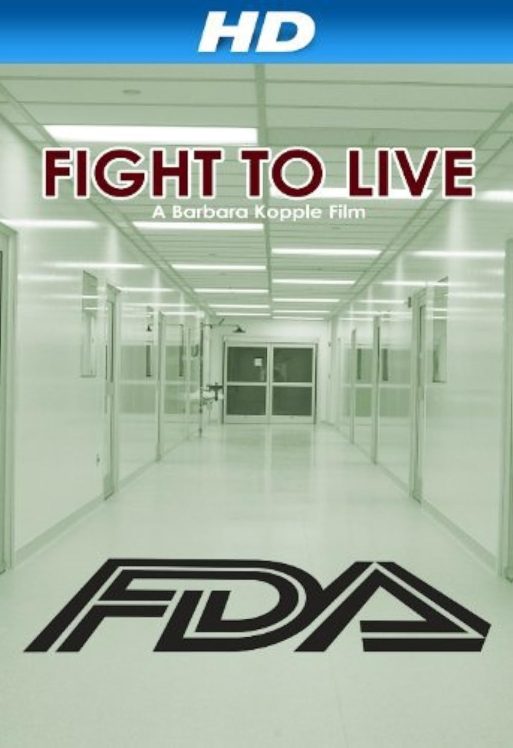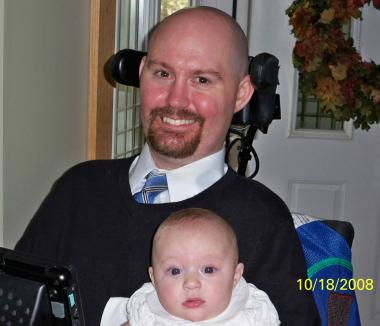 “Fight To Live” is a 2012 documentary that highlights the shortcomings of the drug approval system employed by the U.S. Food and Drug Administration. The documentary makes the case that a person with a terminal illness with no known cure should have access to drugs that have only been partially tested if they have been shown to improve patients’ conditions, even a little bit. If someone is going to die regardless, why not let them take a drug if there is any chance it may help them?
“Fight To Live” is a 2012 documentary that highlights the shortcomings of the drug approval system employed by the U.S. Food and Drug Administration. The documentary makes the case that a person with a terminal illness with no known cure should have access to drugs that have only been partially tested if they have been shown to improve patients’ conditions, even a little bit. If someone is going to die regardless, why not let them take a drug if there is any chance it may help them?
The film begins with an introduction to Steve Walker, co-founder of a patient advocacy group known as the Abigail Alliance. “The Abigail Alliance is,” in the words of the filmmaker, “an advocacy group that helps patients navigate the bureaucracy of the FDA.” The Alliance works with attorneys to try to acquire drugs for patients that could improve their conditions, but have not been 100 percent approved by the FDA.
Mr. Walker’s wife, Jennifer, developed colon cancer years ago. When they found out she had the disease, it had already progressed to stage 4. It seemed to them at the time that some investigational drugs may have been the best option to improve her quality of life. Long story short, Mr. Walker took it upon himself to research online why they were not able to access those drugs. It became very clear to him that the problem was the FDA’s drug approval system.
Patients Tell Their Stories
After introducing us to Mr. Walker, the filmmakers usher in Gwynne Hickman and her son, Erik Metzler. Erik had amyeotrophic lateral sclerosis, a uniformly fatal nerve disease. His backstory is like many of those who have ALS. He was a football player in high school, went to college, always took care of himself and was very active with youth sports in his community.

Erik Metzler, whom we meet in “Fight To Live.” Source: concussionfoundation.org
However, when we meet him, the disease has taken control of his body. He cannot speak. But he does have a nifty reflector contraption on his nose that allows him to focus on specific letters or words on a computer screen, which enables him to “speak” via the computer system.
“Patients find us when they’ve run out of all approved options,” says Mr. Walker, “[and] can’t get into clinical trials. They realize there’s a drug that might help, and in trying to obtain access to that drug, find that they can’t.” It is Erik and his mother who introduce us to the first of many trial drugs discussed in “Fight To Live,” IPLEX.
IPLEX was “originally approved for children’s growth deficiencies, and is believed to slow the progression of ALS and may reverse muscle atrophy caused by the disease,” according to “Fight To Live.” It is a growth hormone. During this segment, Mr. Walker makes the important point that, “the risk of a disease like ALS far outweighs the potential that a drug that’s only been partially tested will harm them.”
We’re then introduced to Bill and Debbie Gattoni. Debbie has ALS, and, according to “Fight To Live,” there was a short period of time when the FDA allowed a small number of ALS patients access to IPLEX through compassionate use, or expanded access. This allows certain individuals access to an investigational new drug outside of a clinical trial.
Debbie was one of 12 ALS patients whose applications for compassionate use of IPLEX were accepted by the FDA. At the time “Fight To Live” was filmed, the Gattonis received a batch of IPLEX once a month. According to Mr. Gattoni, “After the first use of IPLEX there was a change in the dexterity of her fingers.”
We come to learn that neither Erik Metzler nor another ALS patient we are introduced to, Sheila Engdahl, were able to access IPLEX outside of the clinical trials. By the end of the film we are told that both have died in the time between the filming and release date. Debbie Gattoni, who received IPLEX, was still alive and her condition had remained stable.
“Fight To Live” does get a bit scientific at times, and there is a lot of legal speak and things that come along with bureaucratic issues. However, the emotional aspect is certainly there. It is so difficult to see the numerous patients we’re introduced to throughout the film suffer the way they do. And it’s even more disheartening to learn about the FDA’s drug approval process.
One of the major takeaways, I believe, is a metaphor that J. Scott Bellanger, counsel for the Abigail Alliance, draws. He essentially says that we allow people to jump off of bridges with parachutes and skydive if they know the risks involved, but once someone is ill, we do not allow them the same right to choose.
Both Sides of the Issue

Credit: businessinsider.com
The film does make a concerted effort to let the FDA make its case. Representatives from the agency claim that approving drugs without completing randomized clinical trials takes away the incentive for people to participate in those trials. It also claims this interferes with the drug development. In these trials, some participants are given placebos, and others are given the experimental drugs to see if the new drugs will benefit patients.
“There are no rewards in the FDA for saying ‘yes,’” says Dr. Vincent Devita, former director of the National Cancer Institute, regarding approval of new medicines. “There are only rewards for saying ‘no.’ If you say ‘yes’ and the drug does something horrible, then you’re in trouble. If you say no and the drug is slow getting approved, you can’t prove [which people] died because they didn’t get it. Or who might have lived had the drug been tested in combination. That’s the dilemma you face.”
Early in the film, Dr. Emil J. Freireich, a professor at the MD Anderson Cancer Center, puts its bluntly: “The FDA is preventing scientists from discovering things, physicians from making decisions about treatment, patients making decisions about their own healthcare. It’s doing everything that we believe as a country is wrong.”
“Fight To Live” is an eye-opening documentary that anyone interested in our health care system should watch. Numerous scientists and doctors who were interviewed for the movie mention that the public needs to get involved in order for the system to change. The FDA, like many aspects of our government, is very resistant to change. That’s why average citizens need to make their voices heard.

 “Fight To Live” by Barbara Kopple
“Fight To Live” by Barbara Kopple


 John Mulaney’s “Funeral Planning” on Netflix: No Real Plan
John Mulaney’s “Funeral Planning” on Netflix: No Real Plan

 Composting Bodies Is Now Legal in a Dozen States
Composting Bodies Is Now Legal in a Dozen States














